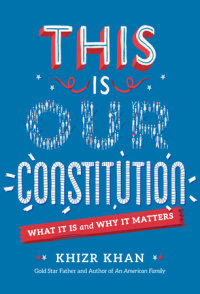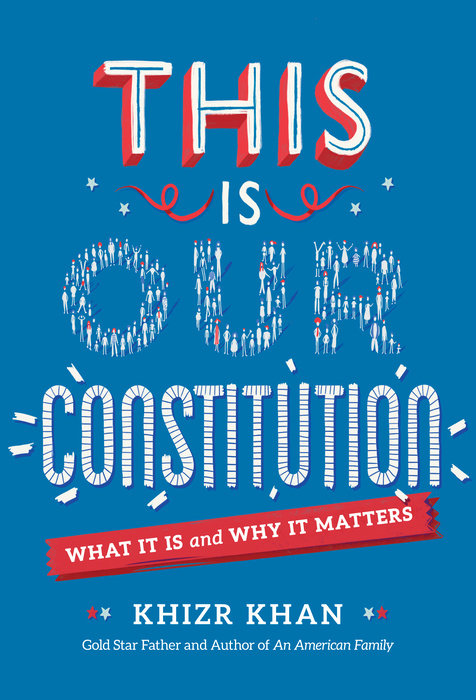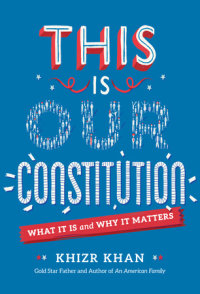This Is Our Constitution
From Gold Star father, beloved Democratic National Convention speaker, and 2022 Presidential Medal of Freedom recipient Khizr Khan comes a book for young people about the Constitution—what it says and why it matters for everyone.
Our Founding Fathers created the U.S. Constitution and Bill of Rights as a blueprint for American government and the rights of American citizens. This document is not merely a piece of parchment but a living, breathing promise of our deepest democratic values.
Khizr Khan grew up in Pakistan, with few of the fundamental rights that are enshrined in the Constitution. He immigrated to America and became a citizen, raising his family to appreciate and honor all our nation has to offer. Khizr Khan is deeply passionate about the Constitution: the guarantees and protections it provides for each and every person and the beacon of light it shines throughout the world.
This Is Our Constitution is a personal journey that Khizr Khan is taking with our nation’s young people.
The book includes:
* A highly personal introduction and conclusion
* Notes throughout that share Khizr Khan’s reflections on and connections to the U.S. Constitution
* The fascinating history of why and how the Constitution was written
*Article by article and section by section, an easy-to-follow explanation of what the Constitution means
* A closer look at key amendments, including the Bill of Rights, and pivotal Supreme Court decisions
* The complete texts of the Declaration of Independence and the Constitution
This is a book about why the Constitution matters to you, and us all.
An Excerpt fromThis Is Our Constitution
Our nation has always looked toward the future. History matters, of course, but the founding documents of the United States are more than history lessons. They point the way forward to a more free, more peaceful, and more just nation. They challenge each generation to build a better United States.
It’s all there at the beginning of the Constitution, the Preamble. The framers of the Constitution thought hard about every word, and they could see far down the road, too. When they sought to “secure the Blessings of Liberty to ourselves and our Posterity,” they were talking about you. You are the posterity for whom they gathered in Philadelphia. You are the future they envisioned.
I know the Constitution will endure because I’ve seen the dignity and the decency of the American people. My wife and I were privileged to raise three fine boys in this great nation.
If you’ve always lived in a country that is ruled by laws, and not by dictators, it’s hard to imagine living without justice, without even any hope for justice. If you’ve always had freedom of speech—the right to speak your mind and openly share your opinions—you probably can’t imagine what it’s like to know that one wrong word could send you to prison for the rest of your life.
I know these fears because I lived with them. I treasure my American citizenship now, but I didn’t grow up with it. I was born in Pakistan in 1950. Located in South Asia, between India and Afghanistan, Pakistan was a newly independent country back then, recently separated from England after nearly two hundred years of British rule. Like many newly liberated nations, Pakistan lacked sound government and sound public services and suffered from public corruption. No one trusted the police. The justice system protected the rich (who bribed their way through it) and terrorized the poor. Journalists went to jail for criticizing the military dictators. You could be arrested for attending a protest rally. You could disappear. You could be killed.
My wife, Ghazala Khan, and I came to America because we wanted to live in freedom. We wanted our children to grow up with the blessings of liberty. And they did.
Of course, our boys groaned every time we made yet another visit to yet another monument in Washington, D.C., and rolled their eyes when their mother and I sang the praises of the Bill of Rights at the dinner table—“Enough already, Baba! You’ve said the same thing thirty times!” But they were paying attention. Our faith in America took root in a new generation.
Humayun Khan, our middle son, studied at the University of Virginia, which was founded by Thomas Jefferson. There, he volunteered for the Army Reserve Officers’ Training Corps (ROTC) because he had a deep desire to serve his country. He believed, as he wrote in a college essay, that sacrifice and vigilance were crucial to liberty and democracy. After graduating in 2000, he joined the army, with plans to eventually attend law school and become a military lawyer. One day in 2004, while serving in Iraq, he ordered his fellow soldiers to hit the ground when he walked toward a speeding taxi armed with bombs. He was killed. His fellow soldiers survived. At the age of twenty-seven, he sacrificed his own life to save the lives of others.
Like so many other brave Americans who have died in service to the United States, our son was a hero. We are moved and humbled by his commitment to our nation. We know how much he loved this country.
The spirit of our democracy, the values to which our son dedicated his life, can be seen in the founding documents of the United States, especially the Declaration of Independence and the Constitution. They express the moral principles that to this day guide our legal and political systems. They are idealistic, and they are also practical. Our founders knew that a house can’t be built on sand, and that a country can’t thrive without a sound government.
But it’s also true that our government can’t function as intended without informed citizens, especially informed young citizens. The Constitution needs each and every one of us to stand with it. Our future depends on you—on your commitment to justice and your dedication to liberty.
The Constitution of the United States has endured for more than 225 years—a remarkable achievement.
While many other countries have wholly altered their governments or entirely rewritten their constitutions during times of social or political unrest, our Constitution is resilient and flexible enough to ride out periods of change and to expand our commitment to justice and equal protection.
In 2016, a wave of hate speech directed against my religion, Islam, broke across the country, and certain politicians encouraged ugly prejudices. Many, including some of the children in my neighborhood, began to fear for their safety and the safety of their friends. They had heard reports that Muslim families wouldn’t be allowed into the United States anymore. They feared that Muslim families would be sent away from America. Parents brought these children to talk to me because I am a lawyer, a person of faith, and a man who is known to carry a copy of the Constitution in his pocket. I tried to assuage their fears by telling the children about the justice and strength of our founding documents.
Then one day, much to our surprise, my wife and I were invited to make a speech about our son Captain Khan at the Democratic National Convention, the gathering at which the Democratic Party chooses its candidates for president and vice president. It would be a public speech at a televised gathering, and we have always been private people. We knew we would be thrust into the limelight, and we were not sure we were ready for it. We asked for time to decide, and we thought and thought at our home in Charlottesville, Virginia, unsure about what to do.



